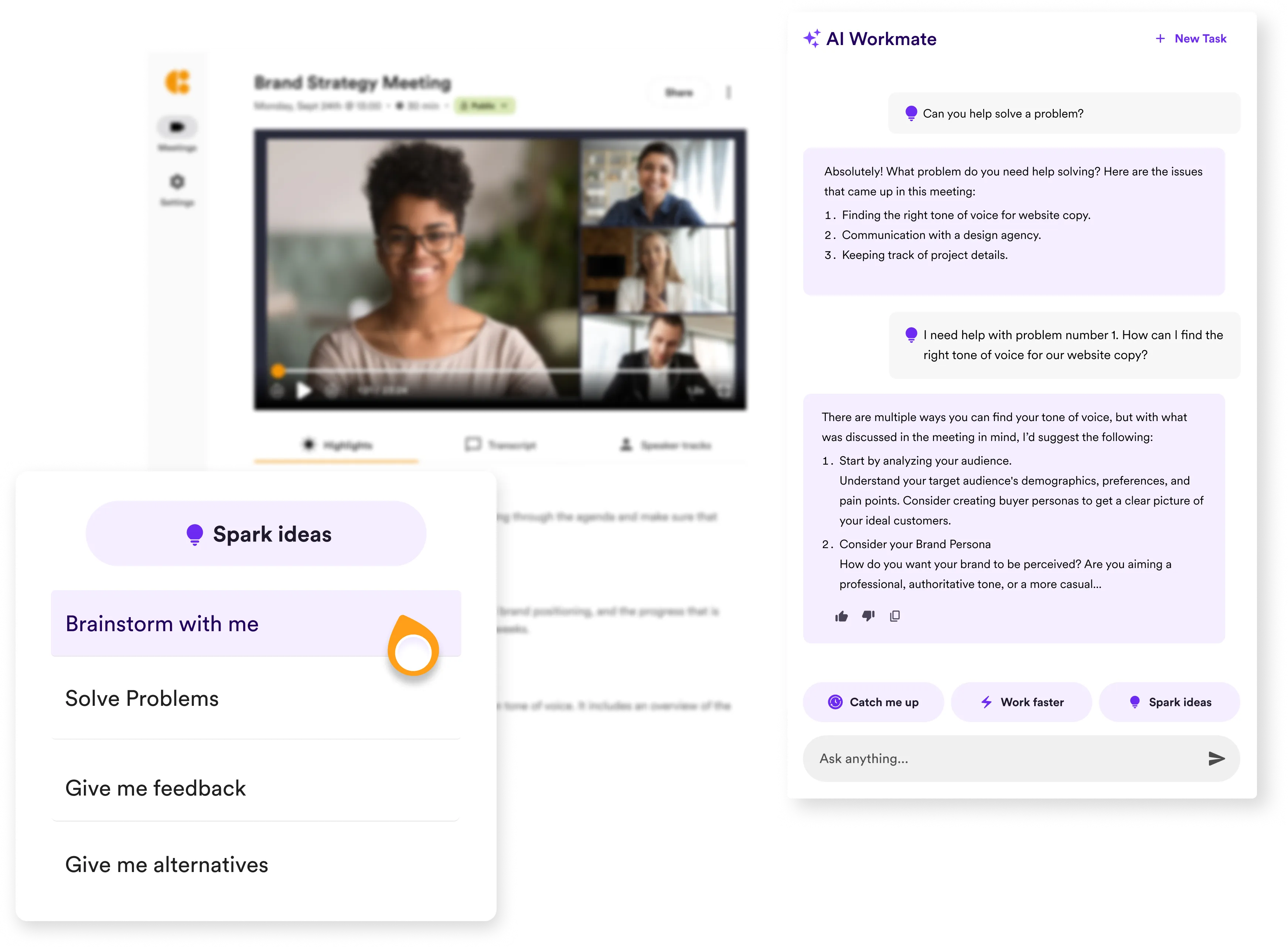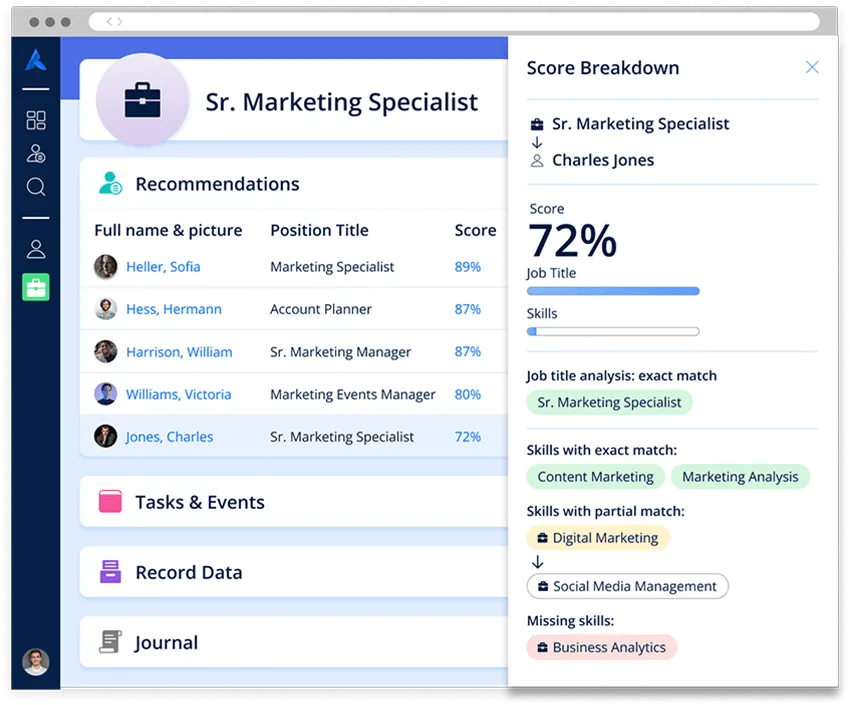The 8 Essential Interviewer Skills

interviewing is a skill—one that’s often underestimated.
Getting it right takes more than following a script.
In this article, we’ll explore the 8 top skills every good interviewer needs to master in order to make better hiring decisions.
1. Active Listening
Active listening allows you to pick up on important details that a less engaged interviewer might miss. It enables you to go beyond surface-level responses and dig into the candidate’s problem-solving abilities, emotional intelligence, and cultural fit.
Listening intently also shows the candidate that you value their input, which can put them at ease and encourage more open, honest responses.
How to Improve Your Active Listening Skills
Improving active listening is simple but requires practice :
- Focus entirely on the candidate when they speak. Put away distractions, including your phone or even your notes.
- Paraphrase what the candidate has said to ensure you’ve understood it correctly.
- Ask follow-up questions to show that you’re not just hearing words but engaging with the meaning behind them.
Example of Active Listening in Action
Imagine a candidate talks about a tough project where they had to pivot due to last-minute client demands. Instead of moving on to the next question, an active listener would dive deeper: “What specific actions did you take to manage client expectations during this pivot?”
2. Honest Communication

Too many interviewers make the mistake of painting an overly rosy picture of the job or the company during interviews. They want to impress the candidate, but this approach often backfires. By not being upfront about challenges, you risk hiring someone who may not be the right fit, leading to turnover and wasted time.
How to Improve Your Honest Communication
- Review the role’s toughest aspects and think about how to frame them positively but truthfully. Instead of hiding challenges, position them as opportunities for growth.
- Prepare to answer tough questions about your company’s culture, management style, and any pain points in the role.
Example of Honest Communication in Action
Suppose a candidate asks about the team dynamics in a department with known communication issues. Instead of glossing over the problem, you might say, “We’ve faced challenges with cross-team communication, but we’re actively working on improving that. It’s an area where your strong collaboration skills could make a real impact.”
3. Open-Ended Questions
Far too many interviewers still rely on yes/no questions that limit a candidate’s ability to demonstrate their skills and experiences.
Open-ended questions go beyond surface-level responses and push candidates to share real-life examples that demonstrate their skills and experiences. These questions reveal how candidates think, solve problems, and handle challenges, offering you a clearer picture of their abilities.
How to Improve Your Use of Open-Ended Questions
- Prepare thoughtful, specific questions that align with the role you’re hiring for.
- Follow up on their answers by asking for more details, which will help you gauge how they approach problems and handle pressure.
- Use behavioral or situational questions that focus on specific scenarios.
Example of Open-Ended Questions in Action
Imagine you're hiring for a leadership position. Instead of asking, “Are you comfortable managing teams?” ask, “Can you describe a time when you had to motivate a disengaged team? How did you approach the situation, and what was the outcome?” This allows the candidate to provide concrete examples of their leadership style and effectiveness.
4. Structured Evaluation

While intuition can sometimes be helpful, it’s a risky and inconsistent method for evaluating candidates. Structured evaluation ensures that you assess candidates based on objective criteria, rather than subjective impressions. It also allows for consistency across interviews.
How to Improve Your Structured Evaluation Process
- Use scoring rubrics or scorecards. These tools allow you to rank candidates based on specific skills or qualities that are essential for the role.
- Use methods like STAR (Situation, Task, Action, Result) to evaluate how well candidates respond to behavioral interview questions.
Example of Structured Evaluation in Action
Let’s say you’re interviewing several candidates for a customer service position. You use a scoring system based on their responses to customer conflict resolution questions. You ask all candidates the same questions and score them using the same criteria.
5. Emotional Intelligence
Your ability to read emotional cues can make all the difference in the quality of information you extract from the interview. Candidates are more likely to open up and offer honest responses when they feel understood and respected.
Emotional intelligence also helps you stay composed during tough interviews. If a candidate becomes defensive or you sense tension, your EI allows you to handle the situation calmly, defusing potential conflict and steering the interview back on track
How to Improve Your Emotional Intelligence as an Interviewer
- Recognize how you react under stress and understand how your emotions might influence your decisions. Practice being present in interviews, focusing not just on the candidate’s words but also on their body language, tone of voice, and facial expressions.
- Make an effort to understand the candidate’s perspective. If a candidate seems anxious, acknowledge it and create a more comfortable atmosphere by offering reassurance or changing the tone of the conversation.
- Avoid interrupting and instead, respond thoughtfully to what the candidate says.
Example of Emotional Intelligence in Action
Imagine a candidate becomes visibly nervous when asked a challenging question about a past failure. Instead of pushing harder or moving on too quickly, a high-EI interviewer would acknowledge the discomfort and say something like, “I understand this can be a tough question. Take your time.”
6. Time Management

When you fail to manage time well in an interview, you risk missing key insights about the candidate. Time management ensures that you get the information you need while maintaining a relaxed, organized atmosphere.
Additionally, candidates often judge the company based on how well-organized the interview is.
How to Improve Your Time Management Skills
- Sructuring the interview in advance. Break it down into segments, such as introductions, core questions, candidate questions, and closing remarks. Allocate specific time blocks for each section.
- Prepare your questions in order of priority. Begin with the most crucial questions to ensure they get answered. If time runs short, you’ll still have covered the key areas that matter most for the role.
- Set a timer or keep a clock in view to stay aware of how much time you have left.
7. Adaptability
Sticking rigidly to a script is a common mistake interviewers make. While preparation is key, being adaptable is what sets great interviewers apart. No two candidates are the same, so no two interviews should be identical.
How to Improve Your Adaptability
Improving adaptability starts with being comfortable with improvisation. While it’s important to have a framework, leave room for deviations. Practice asking follow-up questions that are directly related to the candidate’s answers, instead of simply moving on to the next item on your list.
Example of Adaptability in Action
Imagine you’re interviewing a candidate for a marketing role, and they mention a side project where they helped a non-profit improve its social media presence. An adaptable interviewer wouldn’t stick to the next planned question but would ask, “Can you walk me through the strategies you used for that project?” This shows interest and allows the candidate to demonstrate their skills in a practical way.
8. Building Rapport
Rapport-building isn’t just about small talk—it’s a strategy to help break down barriers and reduce the natural tension that comes with job interviews. When candidates feel like they’re having a conversation rather than facing an interrogation, they’re more likely to give you detailed, honest responses.
How to Improve Your Rapport-Building Skills
- Start the interview with light, non-work-related questions. Ask about the candidate’s weekend, hobbies, or something you noticed on their resume that seems interesting but less formal, such as a shared interest.
- Mirror the candidate’s communication style. If they seem more formal, follow suit. If they’re relaxed and conversational, adjust your tone to match.
- Show you are genuinely interested in the candidate’s answers. Acknowledge and node often on the words said by your candidate.
Example of Building Rapport in Action
Imagine starting an interview by commenting on a unique aspect of the candidate’s background, such as a volunteer role or an interesting career shift. This simple acknowledgment can turn the conversation into a more personal, relaxed dialogue. For instance, you could say, “I noticed you worked on a community project. What inspired you to get involved?”
Better Focus by Automating your Notes : Noota

Noota’s AI meeting assistant is designed to streamline the entire interview process, allowing you to focus on the candidate rather than on manual tasks :
- Automatic Recording & Transcription : Noota automatically records and transcribes interviews in real-time. Instead of scribbling down notes during the conversation, the tool captures every word, providing an accurate transcription you can refer to later.
- Structured Summaries : After each interview, Noota generates structured summaries that highlight the key points of the conversation. Instead of combing through pages of raw notes, you get a concise, organized overview of the most important takeaways.
- Objective Evaluation : Noota uses structured methods like STAR (Situation, Task, Action, Result) to objectively evaluate candidate responses. You can customize evaluation templates to match your hiring criteria, ensuring consistency across all interviews.
Want to fully focus on your interview thanks to note-taking automation ? Try Noota for free.
Leverage your Interview Data
AI interview notes, scorecard, follow-up, ATS integration, and more...
Related articles

Forget note-taking and
try Noota now
FAQ
In the first case, you can directly activate recording as soon as you join a videoconference.
In the second case, you can add a bot to your videoconference, which will record everything.
Noota also enables you to translate your files into over 30 languages.

.svg)
.svg)
.webp)

.png)


.svg)
